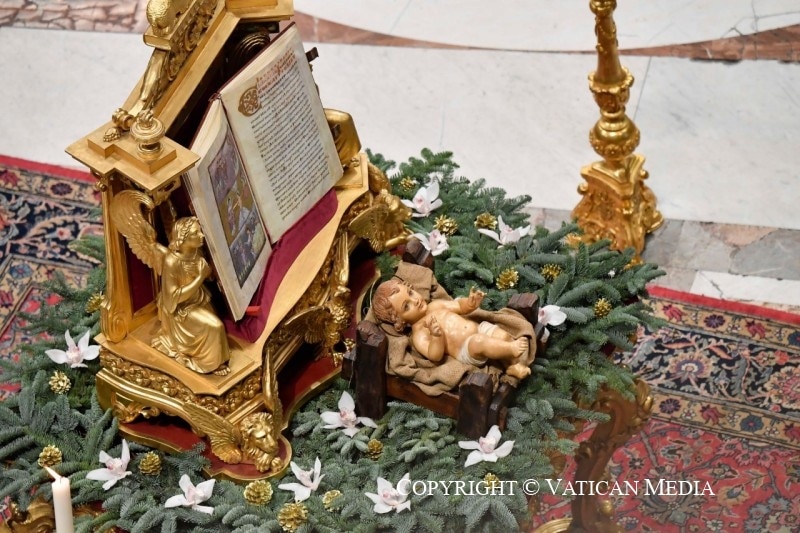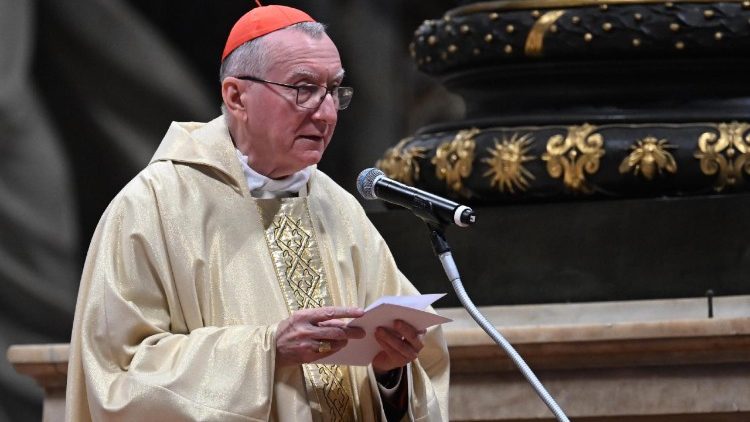Our concerns, our spiritual paths…. must converge in adoration of the Lord
Homily of Pope Francis at the Mass for the Epiphany of the Lord

At 10 am this morning, Solemnity of the Epiphany of the Lord, the Holy Father Francis presided at Mass in St Peter’s Basilica.
We publish below the text of the homily that the Pope delivered after the proclamation of the Holy Gospel:
Homily of the Holy Father
Like a rising star (cf. Num 24:17), Jesus comes to enlighten all peoples and to brighten the nights of humanity. Today, with the Magi, let us lift our eyes to heaven and ask: “Where is the child who has been born?” (Mt 2:2). Where can we find and encounter our Lord?
From the experience of the Magi, we learn that the first “place” where he loves to be sought is in restless questioning. The exciting adventure of these Wise Men from the East teaches us that faith is not born of our own merits, thoughts and theories. Rather, it is God’s gift. His grace helps us to shake off our apathy and opens our minds to ask the important questions in life. Questions that challenge us to leave behind our presumption that everything is fine, questions that open us to what is beyond us. For the Magi, that was the beginning: the restlessness of those willing to ask questions. Filled with yearning for the infinite, they scan the heavens, find themselves marvelling at the brilliance of a star, and experience the quest for the transcendent that inspires the progress of civilizations and the tireless seeking of the human heart. The star left them with a question: Where is the child who has been born?
Brothers and sisters, the journey of faith begins whenever, by God’s grace, we make room for the restlessness that keeps us awake and alert. It begins when we are willing to ask questions, when we are dissatisfied with our daily routine and take seriously the challenges of each new day. When we step out of our comfort zone and decide to confront the uncomfortable aspects of life: our relationships with others, unexpected events, projects needing to be undertaken, dreams to be realized, fears to be faced, physical and mental sufferings. At such times, deep in our hearts, we find ourselves before the irrepressible questions that lead us to seek the Lord: Where do I find happiness? Where do I find that fullness of life to which I aspire? Where do I find a love that does not fade away, a love that endures even in the face of frailty, failure and betrayal? What hidden opportunities are present in the midst of my crises and my sufferings?
Yet each day the very air we breathe is full of “tranquilizers of the soul”, surrogates meant to sedate our inner restlessness and to suppress those very questions: new items to consume, empty promises of pleasure and non-stop media controversies, the idolatry of fitness. Everything seems to tell us: Don’t overthink things; let go and enjoy life! Often we try to soothe our hearts with creature comforts. If the Magi had done that, they would never have encountered the Lord. The danger is that we sedate our hearts, sedate our souls in order to quell our inner restlessness. God, however, is always there, there within our restless questioning. In that questioning, we “seek him as the night seeks the dawn… He is present in the silence that troubles us in the face of death and the end of all human grandeur. He is present in the longing for justice and love deep within our hearts. He is the holy mystery that responds to our yearning for the Totally Other; a yearning for perfect and consummate justice, reconciliation and peace” (C.M. MARTINI, Incontri al Signore Risorto. Il cuore dello spirito cristiano, Cinisello Balsamo, 2012, 66). That, then, is the first place where we can encounter the Lord: in restless questioning. Do not be afraid to enter into this restless questioning, for that is the path that lead us to Jesus.
The second place is in the risk of journeying. Questioning, including spiritual questioning, can lead to frustrations and desolations unless we embark upon a journey, unless we turn ourselves, in the depths of our being, to the face of God and the beauty of his word. Benedict XVI said of the Magi: “Their outward pilgrimage was the expression of their inward journey, the inner pilgrimage of their hearts” (Homily for Epiphany, 6 January 2013). The Magi in fact did not simply study the heavens and contemplate the light of the star; they set out on a journey full of risks, without safe roads and clear maps. They wanted to discover this King of the Jews, to learn where he was born, where they could find him. And so, they asked Herod, who in turn summoned the leaders of the people and the scribes who pore over the Scriptures. The Magi were on a journey; most of the verbs used to describe them are verbs of movement.
The same is true of our faith: without a continuous journey in constant dialogue with the Lord, without attentive listening to his word, without perseverance, faith cannot grow. It is not enough to entertain some vague idea about God, to say some prayer that salves our consciences. We need to become disciples, following Jesus and his Gospel, bringing everything to him in prayer, seeking him in the events of our daily lives and in the faces of our brothers and sisters. From Abraham, who set out for an unknown land, to the Magi, who set out behind the star, faith has always been a journey, a pilgrimage, a history of starts and restarts. Let us never forget that faith is a journey, a pilgrimage, a history of starts and restarts. Let us remind ourselves that a static faith does not grow; we cannot enclose faith in some personal devotion or confine it within the four walls of our churches; we need to bring it outside and to live it in a constant journey towards God and towards our brothers and sisters. Today, let us ask ourselves: Am I journeying towards the Lord of life, to make him the Lord of my life? Jesus, who are you for me? Where are you calling me to go, and what are you asking of my life? What decisions are you inviting me to make for the sake of others?
Finally, after restless questioning and the risk of journeying, the third place where we encounter the Lord is in the wonder of worship. At the end of their long journey and tiring quest, the Magi entered the house, where “they saw the child with Mary his mother; and they knelt down and paid him homage” (v. 11). This is what really matters: our restlessness, our questioning, our spiritual journeys and the practice of our faith must all converge in worship of the Lord. There they find their centre and source, for there everything begins, for the Lord himself enables us to feel and act. Everything starts and ends there, because the purpose of everything is not to achieve a personal goal or to receive glory for ourselves, but to encounter God. To let ourselves be enveloped by his love, which is the basis of our hope, which sets us free from evil, opens our hearts to love others, and makes us a people capable of building a more just and fraternal world. Our pastoral activities will be fruitless unless we put Jesus at their centre and fall down in worship before him. The wonder of worship. Then we will learn to stand before God, not to ask for something or to do something, but simply to halt in silence and abandon ourselves to his love, letting him take us by the hand and restoring us by his mercy. We pray often, asking for things or in reflection… but usually we forget the prayer of adoration. We have lost the sense of worship because we have lost our restless questioning and have lost the courage to continue on our journey with all its risks. Today, the Lord calls us to imitate the Magi. Like the Magi, let us fall down and entrust ourselves to God in the wonder of worship. Let us worship God, not ourselves; let us worship God and not the false idols that seduce by the allure of prestige or power, or the allure of false news; let us love God and not bow down before passing things and evil thoughts, seductive yet hollow and empty.
Brothers and sisters, let us open our hearts to restlessness, let us ask for the courage to continue our journey, and let us finish in worship! Let us not be afraid, for this is the path of the Magi, the path of all the saints throughout history: to welcome our restlessness, to set out and to worship. Brothers and sisters, may we never stop our restless questioning; may we never interrupt our journey by yielding to apathy or convenience; and in our encounter with the Lord, may we abandon ourselves to the wonder of worship. Then we will discover that a light shines even in the darkest nights: the light of Jesus, the radiant morning star, the sun of justice the merciful splendour of God, who loves every man and woman, and all the peoples of the earth.
Related

John Paul II: The Tireless Pilgrim Who Continues to Inspire the World
Exaudi Staff
03 April, 2025
2 min

Pope Francis and Hope: Reflection on Jesus’ Encounter with Zacchaeus
Exaudi Staff
02 April, 2025
2 min

Technology with a Human Face: Pope Francis’ Call for Ethical and Caring Use
Exaudi Staff
01 April, 2025
1 min

Pope Francis Continues Optimistic Recovery and Maintains Work Pace
Exaudi Staff
01 April, 2025
2 min
 (EN)
(EN)
 (ES)
(ES)
 (IT)
(IT)

